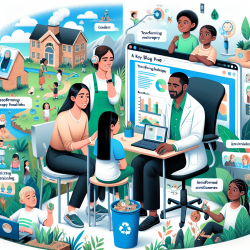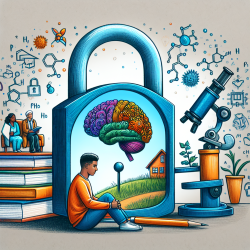Introduction
As a practitioner in the field of speech-language pathology, continuous improvement and adaptation to new research findings are crucial for providing the best outcomes for children. The recent research article titled Creating Environmental Health Leaders When Educators Are Learning Too offers valuable insights that can be applied to enhance your skills and effectiveness in therapy. This blog post will delve into the key outcomes of the research and provide actionable steps to integrate these findings into your practice.
Key Outcomes of the Research
The study highlights the importance of developing leadership skills in educators to better address the multifaceted challenges posed by environmental health issues. Here are the main takeaways:
- Leadership Development: Effective leadership is linked to improved patient outcomes, increased satisfaction among practitioners, and enhanced performance of basic skills.
- Collaborative Learning: Co-development of knowledge between educators and students can lead to a more comprehensive understanding of environmental health issues.
- Integration of Environmental Content: Embedding environmental health topics into existing curricula can prepare future practitioners to address the health impacts of climate change.
Implementing the Research Findings
To improve your skills and create better outcomes for children, consider the following steps based on the research findings:
1. Develop Leadership Skills
Leadership training is not just for those in administrative roles; it is essential for all practitioners. Effective leadership can lead to better patient outcomes and increased job satisfaction. Consider enrolling in leadership development programs or workshops that focus on environmental health and advocacy.
2. Engage in Collaborative Learning
Collaborative learning between educators and students can enhance understanding and foster innovation. Create opportunities for peer learning and mentorship within your practice. This can be achieved through regular team meetings, workshops, and collaborative projects focused on environmental health issues.
3. Integrate Environmental Health Topics
Incorporate environmental health topics into your therapy sessions. Educate children and their families about the impacts of environmental factors on health. This can be done through interactive activities, educational materials, and discussions that highlight the importance of a healthy environment.
Encouraging Further Research
The research underscores the need for continuous learning and adaptation. As practitioners, it is essential to stay updated with the latest findings and integrate them into your practice. Encourage your colleagues to engage in further research and share their findings. This collective effort can lead to significant improvements in therapy outcomes.
Conclusion
By implementing the outcomes of the research presented in Creating Environmental Health Leaders When Educators Are Learning Too, you can enhance your skills and create better outcomes for the children you serve. Developing leadership skills, engaging in collaborative learning, and integrating environmental health topics into your practice are crucial steps towards achieving this goal.
To read the original research paper, please follow this link: Creating Environmental Health Leaders When Educators Are Learning Too.










